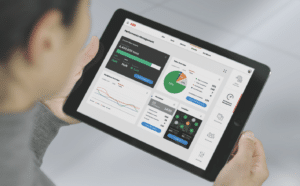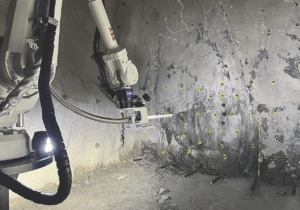ABB’s ‘Mining’s Moment’ report highlights the industry’s progress in making operations more sustainable and the embracing of decarbonisation.
Thinking about decarbonising a mining operation and actually doing it are two very different things.
Conducted by an external and independent market research agency, ABB surveyed 412 mining executives from 18 countries across Asia, Europe, North America, South America, South Africa and Australia for its ‘Mining’s Moment’ report.
Of those surveyed in Australia, made up of 64 per cent male and 36 per cent female representatives, 82 per cent said they were excited by the opportunities presented by the increasing recognition of mining’s role in supplying resources for green technologies.
Perhaps more significantly, exactly half of those surveyed said they anticipate significant or complete transformation of their operations over the coming five years.
Pair that with 32 per cent reporting that their mining businesses are behind on their decarbonisation objectives and there is clear recognition that decarbonisation is the path forward; it’s a matter of when, not if.
“People are saying the industry is going to change,” ABB Australia head of process industries Stuart Cowie told Australian Mining. “The decarbonisation transformation is happening, and our ‘Mining’s Moment’ report reflects this.”
Only 11 per cent of respondents are very confident they will achieve their 2030 decarbonisation goals. This rises to 37 per cent when it comes to achieving 2050 targets.

Image: ABB
Cowie drilled down into the results more closely.
“Of the Australian respondents, 76 per cent agree that to achieve decarbonisation an integrated approach involving a combination of electrification, automation and digitalisation is necessary,” he said.
“And by 2026, 35 per cent of Australian respondents plan to invest in electrifying their haulage fleets, while 73 per cent are planning to electrify at least 25 per cent of their fleet by 2030.”
Australia is a front runner in this regard, with 79 per cent of Australian respondents considering vehicle electrification as being the most important lever to achieve decarbonisation goals. The global average for this question was 76 per cent.
But the Australian mining sector still faces its barriers.
“While 57 per cent cited capital investment as a barrier to decarbonisation, 53 per cent cited inadequate infrastructure,” Cowie said.
Just under 39 per cent of the Australian executives surveyed consider unproven technologies as a barrier, while 44 per cent are worried about the disruption to operations.
While a big-bang approach has proven a success for greenfield mines, an incremental approach to decarbonisation can be an effective way to navigate initial cost and trust concerns.
“The incremental approach is a miner’s way of trying to stay within budget but also make gains towards their goals,” Cowie said. “It could involve upgrading certain fleets of equipment and sub processes or changing to more efficient fuel or motors.
“Adding sustainable practices bit by bit also enables companies to trial technologies before they make a significant investment and adopt it across the whole plant.”
Cowie highlighted ABB’s partnership with Gold Fields and the company’s Granny Smith gold mine in Western Australia as an example of where an incremental approach has proven fruitful.
“We’ve helped Gold Fields digitalise the Granny Smith underground mine, implementing and integrating an operations management system, with a fleet management system supporting the latest Industry 4.0 interoperability standards set to follow,” he said.
“We embedded some of our digital engineers into Gold Fields’ office at Granny Smith, and we also had our research and development (R&D) teams in Zurich and Sweden supporting the project.

Image: ABB
“We have been able to surround the project with different pockets of excellence, whether it is fleet control, yield or operations management, and we have formed a team, which is really important for any digitalisation or decarbonisation project.”
ABB’s regional factsheet found 71 per cent of Australian respondents believe partnerships, like ABB’s collaboration with Gold Fields, are critical to meeting decarbonisation targets.
When asked what he expected decarbonisation in the Australian mining industry to look like in the next five years, Cowie lifted the lid on some pioneering technologies.
“We’re working with the mining industry to improve charging capabilities of diesel-electric haul trucks,” he said. “This involves a fast-charging, trolley-assist solution.”
Companies that implement ABB’s eMine trolley assist system can achieve up to a 90 per cent reduction in their carbon emissions when compared with a diesel machine. Trolley-assisted trucks can also achieve higher speed-on-grade, improving operational productivity and accelerating return on investment.
Cowie also highlighted ABB’s hoisting solutions, which can offer a zero-emission alternative to haul trucks, particularly as mines get deeper.
ABB hoists at BHP’s Prominent Hill copper mine in South Australia are helping the major miner meets its productivity and sustainability targets.
ABB’s ventilation on-demand solution is another way to drive down emissions, with miners able to select when and at what intensity ventilation is used in underground mines.
Cowie said the regional factsheet highlights Australia’s changing sentiment towards the digitalisation, automation and electrification that will underpin future mines, with companies more enthusiastic about the opportunities to not only make their operations more environmentally friendly but also more productive.
“The opportunities we’re talking about are not just within mines,” Cowie said. “What we’re seeing is, through their innovations, miners are now excited about providing resources for green technology across all other industries.
“A lot of executives see this as a great opportunity to commercialise solutions for the whole green transition.
“And through their dealings with other sectors, mining is not just being seen as part of the problem anymore, but now it’s also being seen as a critical part of the solution to the world’s decarbonisation journey.”
This feature appeared in the December 2024 issue of Australian Mining.




